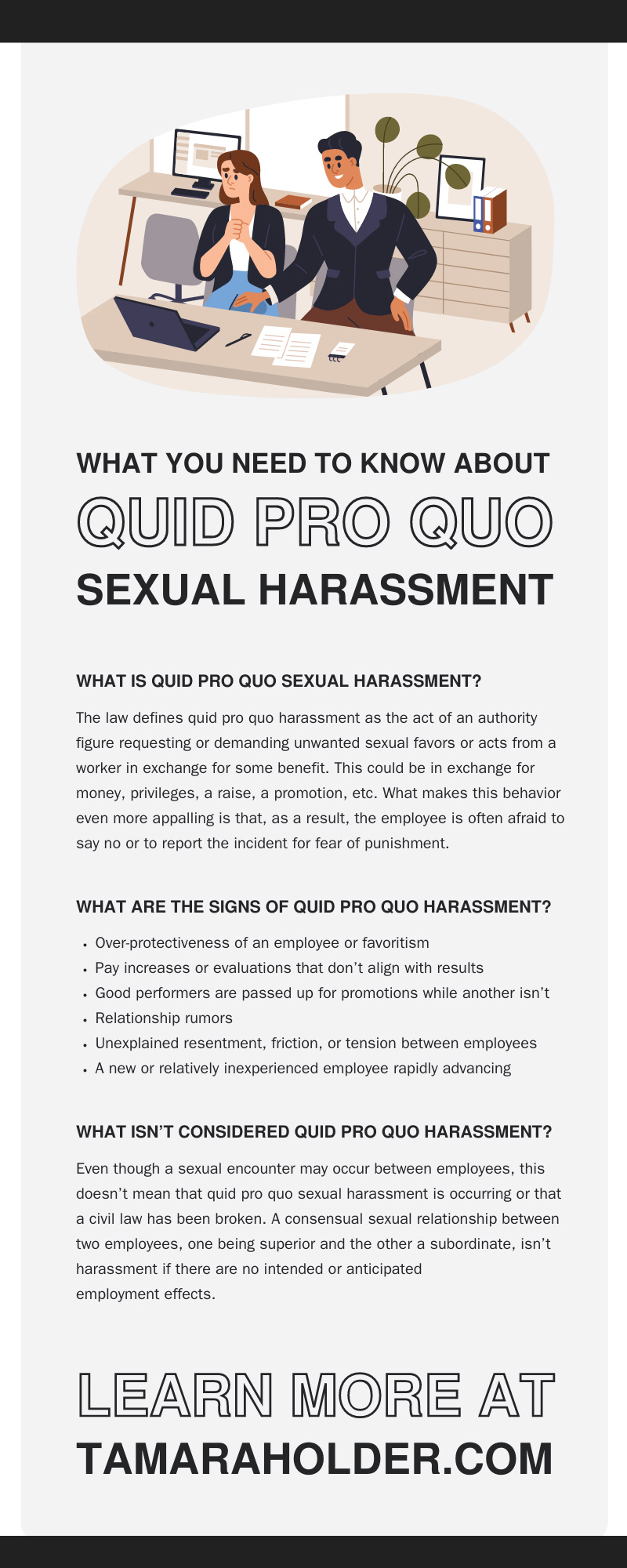In Latin, the phrase quid pro quo translates to “something for something.” To apply a more modern phrase with the same meaning, “you scratch my back, I scratch yours,” would be an apt comparison. However, quid pro quo sexual harassment is never the reciprocal favor these phrases might suggest. In fact, it is an appalling power play that ruins lives and puts fear and anxiety in the hearts of workers everywhere. To help protect and empower you as an employee, let’s examine what you should know about quid pro quo sexual harassment.
Before we can fully understand what quid pro quo sexual harassment is, we first must review what the law defines as sexual harassment. It’s important to understand that the term sexual harassment is very broad and encompasses many types of unwanted sexual attention. Sexual harassment violates civil laws, as it typically occurs in professional settings, such as the workplace. Sexual harassment can include but is not limited to sexual jokes, innuendos, insults, threats, pranks, bribes, videos, and even sexual assault.
While you may get reprimanded or fired for sexual harassment, not all instances are criminal, such as sexual jokes or innuendos. Typically, many policies and rules are in place at work to prevent these things from happening, but they don’t always succeed. There is an inherent power imbalance at work that can turn sexual harassment into quid pro quo harassment.
For most Americans, their job is their livelihood, and even if someone isn’t living paycheck to paycheck, chances are that they can’t afford to lose their job. This is where the power imbalance comes into play. If your boss, employer, or higher-up wants to punish you for the wrong reasons, they can. Of course, it’s illegal, but that doesn’t mean they can’t and won’t do it. How does this fit in with quid pro quo harassment?
The law defines quid pro quo harassment as the act of an authority figure requesting or demanding unwanted sexual favors or acts from a worker in exchange for some benefit. This could be in exchange for money, privileges, a raise, a promotion, etc. What makes this behavior even more appalling is that, as a result, the employee is often afraid to say no or to report the incident for fear of punishment. As mentioned, many Americans can’t afford to lose their jobs, so when it comes down to doing what they say versus losing their jobs, many are often left with no choice.
Unfortunately, quid pro quo sexual harassment can often go unnoticed due to subtlety and lack of reporting—the abuser will likely act in secret to remain out of trouble. This makes it difficult for other employees, managers, and HR to determine what’s happening and pinpoint this sexual harassment. However, there are signs that can help others identify quid pro quo harassment. While some of these signs on their own aren’t immediately indicative of harassment, it’s important to watch out for the following:
If the signs above aren’t enough to help you identify this type of harassment, you aren’t alone. Sometimes, knowing what to look for isn’t enough, and you may have doubts or concerns about what you’re observing. To help, let’s take a look at a few examples.
On the Inside: Christine meets with her boss for a quarterly review, and the results don’t look so good. She’s new and hasn’t been fully trained, so the results are not necessarily out of the norm. Her boss tells her that he can make the review look better if she performs sexual acts for him. She says no, but he threatens to fire her if she doesn’t obey.
On the Outside: Despite Christine’s lack of training, she’s been quickly promoted and seems overwhelmed by all her new responsibilities and tasks. Her boss requests visits with her often and alone. When the two are together in meetings or staff events, Christine avoids him. There are rumors around the office that employees have seen Christine’s boss looking inappropriately at Christine and making rude gestures behind her back.
On the Inside: Mark is a well-trained employee who does his job very well. One day, he makes a small mistake at his job, and his boss calls him into his office to talk about it. His boss says he could be fired for what he did, even though Mark is great at his job and the mistake was minimal. Regardless, his boss only agrees not to let him go if he performs a sexual favor.
On the Outside: Mark’s boss is ice cold toward him, ignores him most days, and says he doesn’t believe Mark is a good employee. Despite this, Mark still has amazing reviews and meets alone with his boss quite often. Other employees have even seen them out in public. Mark maintains that he’s fine, but his once-great work is declining, and he often appears tired or sad.
Even though a sexual encounter may occur between employees, this doesn’t mean that quid pro quo sexual harassment is occurring or that a civil law has been broken. A consensual sexual relationship between two employees, one being superior and the other a subordinate, isn’t harassment if there are no intended or anticipated employment effects. Additionally, sexual harassment can occur, but if there isn’t a “something for something” exchange, it isn’t considered quid pro quo sexual harassment. Conversely, if a “something for something” exchange does occur but is void of a sexual act, it is not quid pro quo sexual harassment but is considered quid pro quo harassment.
The most important thing you need to know about quid pro quo sexual harassment is that it is never the victim’s fault. Claims should always be taken seriously and with respect.
If you believe you’ve been a victim of quid pro quo sexual harassment, know that there are people who care and are willing to represent you with everything they have. Contact sexual harassment lawyer Tamara N. Holder today and make the strides toward justice.
